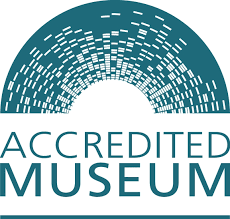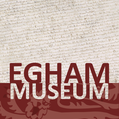Egham Museum submits its Accreditation Return
 Today, Friday 14th October, Egham Museum submitted its Return submission to the Museum Accreditation Scheme, managed by Arts Council England, in order to remain a Fully Accredited Museum.
Today, Friday 14th October, Egham Museum submitted its Return submission to the Museum Accreditation Scheme, managed by Arts Council England, in order to remain a Fully Accredited Museum.
But what is Accreditation, the Arts Council, and what does this actually mean for museums?
The Arts Council England is a national organisation that champions, develops and invests in artistic and cultural experiences that enrich people’s lives. They are funded by the Government via the Department of Culture, Media and Sport; they use this funding to support a range of activities across the arts, museums and libraries – from theatre to digital art, reading to dance, music to literature, and crafts to collections – through their 10 year strategic vision, ‘Great Arts & Culture for Everyone‘.
Museums are a recent addition to the Arts Council’s portfolio, but one they take very seriously. This includes the adoption and ongoing delivery of the museum sector’s national Museum Accreditation Scheme (MAS). The Scheme first began in the late 1980s under the term ‘Registration’ and in the early years, was intended to be a simple way of identifying and accounting for museums across the country. As the museum sector continued to develop and professionalise, it became apparent that museums would need to set in place minimum standards to ensure they remained responsible, business-like, self-reflective and accountable to the public they served, and in 2004, the scheme was renamed Accreditation to better reflect its purpose.
The scheme is regarded as one of the most innovative and effective developments in the museum sector. It has led the way in raising museum standards in the UK, and has been used as a model and source of inspiration for similar schemes overseas.
So what does an Accredited museum do and why does it matter?
To be an Accredited museum, organisations have to meet certain minimum standards that demonstrate their professionalism and continual development in three main areas. These are: ‘Organisational Health’, ‘Collections’ and ‘Users and their Experiences’. Examples of what these standards and requirements are include ensuring a museum has a fully functioning and realistic Business Plan addressing finance and succession, various policies and procedures in place for the care of the collections, knows who its visitors are and how it can improve its community reach. Accredited museums must be registered charities, and comply with charitable law.
While the technicalities of being an Accredited Museum are very much about compliance, standards and good practice through the day-to-day internal workings of a museum, this does not mean it is of no benefit to our visitors and the community we serve. Our visitors can expect a high quality, trusted and professional experience when they enter our museum: if you donate an object to us, you can be assured we will take care of it to the best of our abilities and it will be held in trust for future generations; if you volunteer for us, you will receive ongoing training and support; and as a visitor, if we do ask you to complete a feedback form, it isn’t because we are being nosy, it is because we want to find out how we can improve and develop our museum to make your visit more enjoyable.
We will find out the outcome of our Accreditation Return application in 2017.
